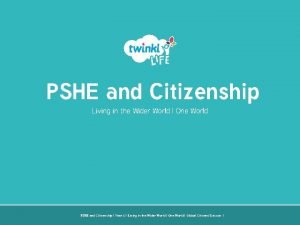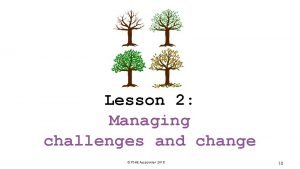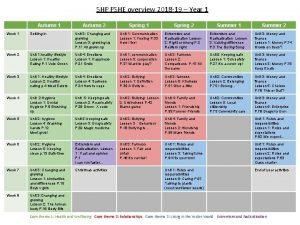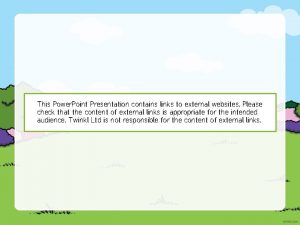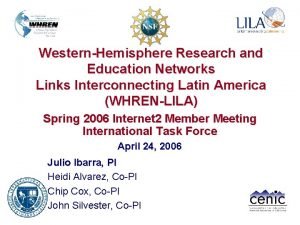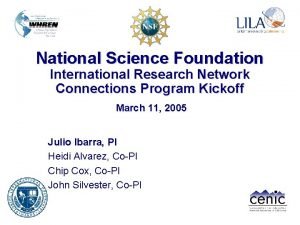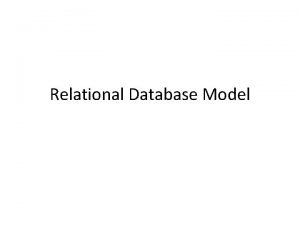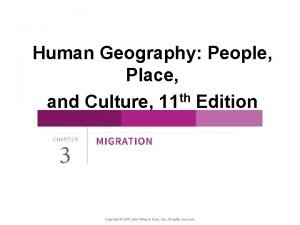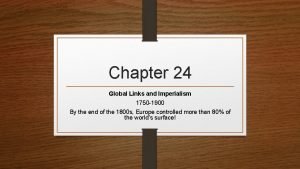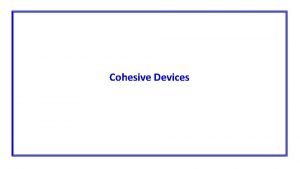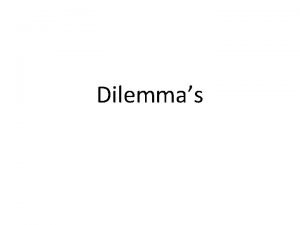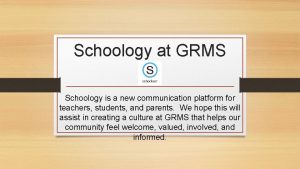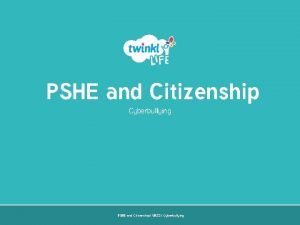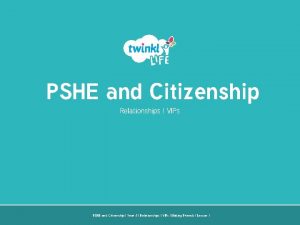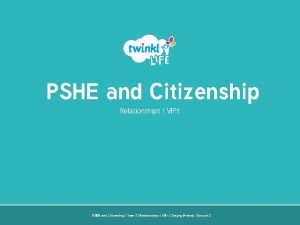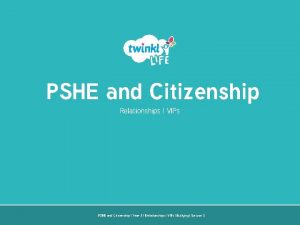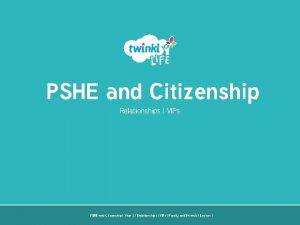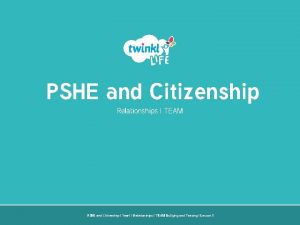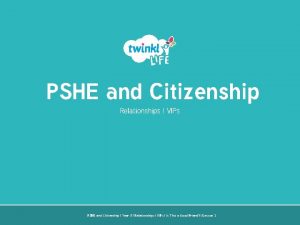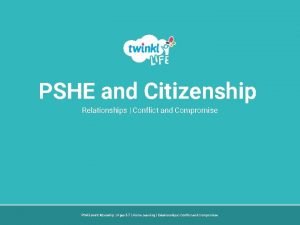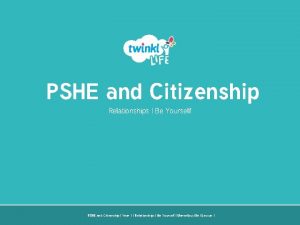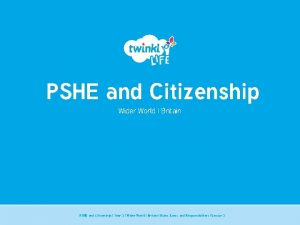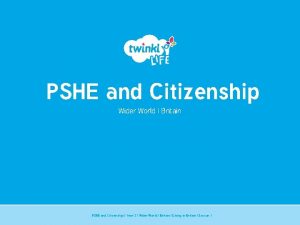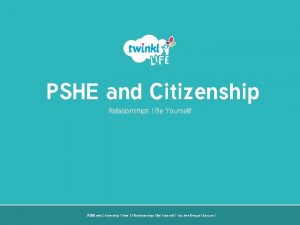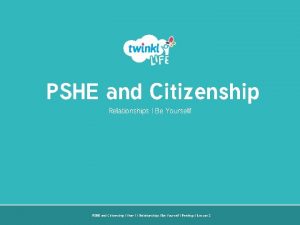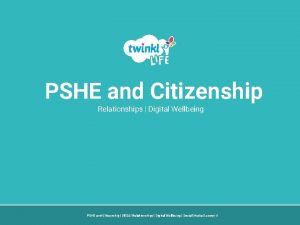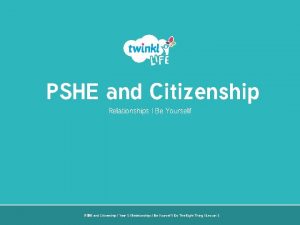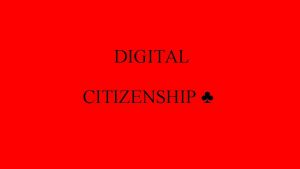Links to PSHE Citizenship Curriculums PSHE Programme of





















![Activity Three: Diary Entry [Gender resource 1. 2] Activity Three: Diary Entry [Gender resource 1. 2]](https://slidetodoc.com/presentation_image_h2/b3437e15924d4670734a996ebb128b54/image-22.jpg)





- Slides: 27

Links to PSHE / Citizenship Curriculums PSHE Programme of Study Core Theme 2. Relationships how to develop and maintain a variety of healthy relationships within a range of social/cultural contexts and to respect equality and be a productive member of a diverse community R 4. to explore the range of positive qualities people bring to relationships R 7. that the media portrayal of relationships may not reflect real life and the possible impact of this on people’s expectations of relationships R 27. about the unacceptability of sexist, homophobic, biphobic, transphobic, racist and disablist language and behaviour, the need to challenge it and how to do so Core Theme 1. Health and wellbeing H 1. to recognise their personal strengths and how this affects their self-confidence and self-esteem H 18. how the media portrays young people; to recognise its possible impact on body image and health issues H 19. that identity is affected by a range of factors, including the media and a positive sense of self H 2. to recognise that the way in which personal qualities, attitudes, skills and achievements are evaluated by others, affects confidence and self-esteem • Recognise and challenge stereotypes • Nature and consequences of discrimination In addition : how to make informed choices Core Theme 3. Living in the wider world L 1. to recognise, clarify and if necessary challenge their own core values and how their values influence their choices L 3. the similarities, differences and diversity among people of different race, culture, ability, disability, sex, gender identity, age and sexual orientation and the impact of stereotyping, prejudice, bigotry, bullying, and discrimination on individuals and communities L 4. strategies for safely challenging stereotyping, prejudice, bigotry, bullying, and discrimination when they witness or experience it in their daily lives L 7. to recognise that they have the same rights to opportunities in learning and work as all other people; to recognise and challenge stereotypes; and/or family or cultural expectations that may limit their aspirations Citizenship the different ways in which a citizen can contribute to the improvement of their community SMSC Pupils’ cultural development is shown by their: understanding and appreciation of the wide range of cultural influences that have shaped their own heritage and those of others interest in exploring, improving understanding of and showing respect for different faiths and cultural diversity and the extent to which they understand, accept, respect and celebrate diversity, as shown by their tolerance and attitudes towards different religious, ethnic and socio-economic groups in the local, national and global communities.

Teacher’s Instructions: Let’s get engaged: 15 minutes 1. Introduce the lesson focus, learning outcomes and links to the SDGs. (UP TO SLIDE 9) 2. Slide 9 – Pupils discuss the Image and Chinese proverb, they then work in small groups to discuss opening questions on slide 11 (Activity One). Feedback to class. Developing Ideas: 25 minutes 3. Slides 10 to 15 – teacher shares lesson focus, explains about inequality[ views of Oxfam] and then discuss how it inequality impacts on all of us- boys. Girls, men/ women 4. Activity Two : Fairness statements on gender Instructions- pupils work in groups of four, they read each statement and put these in order of how fair they all feel it is. They then Discuss how they feel about these statements. What do I think? Responding: Summary - 20 minutes 5. Teacher shows newspaper headlines from UK and then plays clips [or chooses their preferred one] slides 18 to 21 Pupils complete Activity Three: Diary Entry - They write a diary entry of no more than 100 words. This is their wish for the future around gender equality. I hope that by the year 2030 ………. . Key words or ideas: • Work, equality, pay, promotion, pay gap, discrimination, poverty, family, marriage, caring 6. Plenary - Pupils share their diary entries (they could be posted around the room or kept as a record to see if pupils ideas/ feelings change over the 6 lessons)

The Big Ideas • Big Idea 4 Gender concepts – the idea of gender equality as a goal – highlight how gender inequality impacts, also the idea of gender equity – how women are helped to improve their position • Big Idea 5 Women and gender inequality – looking at how women are disadvantaged and its consequences

Gender Lesson 2 Global Inequality and Gender Should we be concerned? The impact of inequality on the lives of women around the world and in Britain.

Learning outcomes Learners will be able to: • To describe some of the inequalities that impact on women’s lives. • To develop opinions about gender inequality in Britain and the rest of the world. • To be able to empathise with women and start to imagine a world where gender inequality has limited or no impact on communities.

Are women equal in Britain? Should they be? What about other parts of the world?

Gender SDG 5: Achieve gender equality and empower all women and girls


What do you think this means? Think –Pair- Share

Activity One In Groups – Discuss the following questions: • Has gender equality been achieved within the UK today? • Give examples where women and men are still not equal. discussion: Are women and men equal in our society today? • What is your view on this? Should this change? How will it change? How long will this take? • How about women in the rest of the world? • What action needs now needs to be taken to help promote gender equality and empower women across the world?

The view of OXFAM What is inequality? Inequality can be linked to race, gender, geography and economy, and factors may work together. Oxfam sees ‘inequality’ as referring to ‘extreme economic (wealth and income) inequality. ’ Why do Oxfam think inequality should be challenged? Whilst a tiny minority of people get richer, millions of people are not receiving a fair reward for their hard work. And it’s not only wealth that is disproportionally allocated to a few individuals, power is too. This means that those with the most can often abuse it. The last thirty years have seen an inequality explosion; Oxfam states that ‘Just sixty-two individuals have the same wealth as half the people on our planet – that’s 3. 6 billion individuals. ’

If you’re a male what does it have to do with you? Tackling gender inequality is not just an issue for women - everyone suffers when so many people are prevented from realising their full potential. Equality is essential to tackle poverty, and both men and women need to be part of the solution.

Why the focus on Gender Inequality? Oxfam's view Gender inequality is the most serious form of discrimination in the world. While this affects everyone, it is women and girls who face the most discrimination as a result of gender inequality. Women and girls form the majority of those living in poverty. Women and Girls have: • • fewer resources, less power and less influence in decision making when compared to men. they are exposed to various forms of violence and exploitation experience further inequality because of their ethnicity, age, race, class, marital status, sexual orientation and (dis)ability. Oxfam think its important that we all talk about these issues. Women need support to have more control and influence. They believe that transforming gender and power relations, and improving women's rights will help end poverty not only for women and girls, but for men and boys too.


What does inequality have to do with gender? • A baby’s gender makes a difference to its life chances. Women account for two thirds of people currently living in extreme poverty and 60% of the working poor in the world. • Globally, women own fewer assets than men. • They earn less money, have fewer legal rights, do the vast majority of unpaid care work, and are grossly under-represented on the political stage. The governments of 128 countries still give women a lower legal status than men. One-in three women suffer physical or sexual violence in their lifetime, and many live in constant fear of abuse. However, women have the greatest potential to end the poverty and injustice that they, their families and communities face.

Activity Two: Facts about Gender- How Fair is it? 1. The majority of the 2. Globally women are 3. Women are less likely world’s poorest less likely to be than men to own land or people are women. involved in decision property. making. 4. The percentage of female Homicide victims worldwide, intentionally killed by an intimate partner or family member is 47% and 6% for men. 5. A study of 83 countries revealed that women earn 1030% less than men for the same work. 6. Over 750 million women and girls alive today were married before their 18 th birthday. 7. On average women do 3 times as much unpaid care and domestic work as men. 8. The proportion of women in national parliaments across the world is 23. 4%. 9. In many marriages or partnerships the male still has the greatest say about when the couple have sex, whether they use contraception and when women can get help from health care staff. Instructions Work in groups of Four Read each statement and put in order of how fair you all feel it is. Discuss how you feel about these statements Gender Resource 1. 1

Activity Two: Facts about Gender. How Fair is it? Extremely Unfair Pretty Unfair

It's getting even harder to be a woman Nov 2017 CNN 0 bn 4 1 n£ o t ou gap, g n si o l pay r K e in U gend n e to m Wo ar due w a ye es sho 8 r 201 u n a g fi t. J den n e p nde I e Th Gende r pay g ap: wo £ 300, 0 men e 00 less arn than m workin en ove g life The Gu r ardian Mar ch 201 6 Women won't have equality for 100 years - World Economic Forum Nov 2017 BBC NEWS Men are still paid more than women in EVERY single occupation Differences in pay are small at younger ages, but from 40 onwards they widen, reaching a peak between 50 and 59 The Mirror

International Day of the Girl: how inequality starts before birth • On International Day of the Girl, we look at the challenges of our unequal world, with girls facing discrimination from the moment of conception through education, health, marriage and employment. World leaders have promised to achieve gender equality by 2030 – but at the current rate of progress this will take more than 100 years. https: //www. theguardian. com/global-development/video/2016/oct/11/a -girls-life-how-inequality-starts-before-birth-video-international-day-ofthe-girl

Hurdles (featuring Emma Watson) https: //www. youtube. com/watch? v=R 51 ijgt. Rq. ZU&feature=player_embedded

Activity Three : Diary Entry Write a diary entry of no more than 100 words. This is your wish for the future around gender equality. I hope that by the year 2030 ………. . Key words or ideas: Work, equality, pay, promotion, pay gap, discrimination, poverty, family, marriage, care WINNING EQUALITY TOGETHER
![Activity Three Diary Entry Gender resource 1 2 Activity Three: Diary Entry [Gender resource 1. 2]](https://slidetodoc.com/presentation_image_h2/b3437e15924d4670734a996ebb128b54/image-22.jpg)
Activity Three: Diary Entry [Gender resource 1. 2]

Plenary I hope that by the year 2030 ………. . Now share your diary entries 1. Are you wanting the same kind of world in 2030 or a different one? 2. How will change happen? 3. What role do men and boys have in this? 4. How will everyone benefit? WHAT MIGHT BE THE OBSTACLES TO CHANGE?

Additional Resources • https: //www. globalgoals. org/films

Key words • • Equality, Diversity, Stereotypes, Prejudice, Discrimination, Emancipation Fairness Inequality Poverty Responsibility Rights Decent work, Gender inequality Unpaid care Women's economic empowerment • Power • •

https: //www. bbc. co. uk/news/world-41844875/www. bbc. co. uk/news/world 41844875

The project is co-funded by DEAR (Development Education and Awareness Raising) Programme of the European Commission. This document was created and maintained with the financial support of the European Union. Its contents are the sole responsibility of the project partners and do not necessarily reflect the views of the European Union.
 Pshe association explainer slides
Pshe association explainer slides Pshe living in the wider world
Pshe living in the wider world Personal learning checklist
Personal learning checklist Pshe association
Pshe association Special schools north tyneside
Special schools north tyneside Pshe ssa
Pshe ssa Pshe financial education
Pshe financial education Power point links
Power point links Regular links with reciprocal article
Regular links with reciprocal article Irnc links
Irnc links Irnc links
Irnc links Gufoni manöver links
Gufoni manöver links Logical view of database
Logical view of database Contextual links in macbeth
Contextual links in macbeth Kinship links definition
Kinship links definition Monofasige motor
Monofasige motor New york links
New york links Kinship links definition ap human geography
Kinship links definition ap human geography Optical fiber simulation
Optical fiber simulation Hyperpoetry example
Hyperpoetry example Vorne hinten links rechts
Vorne hinten links rechts Global links and imperialism
Global links and imperialism Links butt
Links butt Misd staff links
Misd staff links Cohesive links
Cohesive links We gaan naar links
We gaan naar links Vorne hinten links rechts
Vorne hinten links rechts Go to stjohnsschools.schoology.com
Go to stjohnsschools.schoology.com

